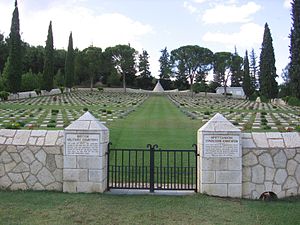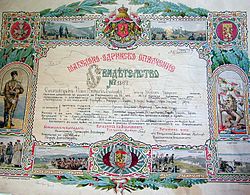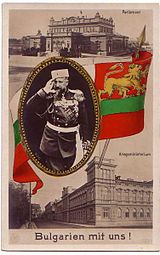- Battle of Doiran
-
Battle of Doiran Part of World War I
1914-1918 British Military Cemetery in Policastron (formerly Karasouli) near DoiranDate September 18–September 19, 1918 Location Dojran Lake, present day Republic of Macedonia Result Bulgarian tactical victory Belligerents  Bulgaria
Bulgaria United Kingdom
United Kingdom
 Greece
Greece
 France
FranceCommanders and leaders  Vladimir Vazov
Vladimir Vazov
 Stefan Nerezov
Stefan Nerezov Henry Wilson
Henry Wilson
 George Milne
George MilneStrength - 9th (Pleven) Infantry division, with parts of 11th Infantry division's 1st Macedonian Brigade and the Mountain Division (Total: 35 000)[1] - United Kingdom: 4 infantry divisions, the 22nd and 26th and two others
- Greece: 2 divisions (around 75 000 men)[2]Casualties and losses 2,726 total[1]  3,155
3,155
 3,948
3,948
Total: 7,103 total.[2]- Krivolak
- 1st Doiran
- Lerin
- Struma
- Monastir (Malka Nidzhe
- Kajmakcalan
- Cerna Bend)
- 2nd Doiran
- 2nd Cerna Bend
- Red Wall
- Skra-di-Legen
- Vardar (Dobro Pole
- 3rd Doiran)
The third Battle of Doiran was fought from 18 September to 19 September 1918, with the Greeks and the British assaulting the positions of the Bulgarian First Army near Dojran Lake. The battle was part of World War I and took place in the Balkan Theatre. The battle ended with Bulgarians repulsing all attacks, but then retreating.
Contents
Prelude
The Greeks and the British set off from their base at Thessaloniki at the same time as the Serbs and the French. The Greeks and the British under George Milne set off the attack on the Bulgarian positions at Dojran while the Serbs and the French under the command of Franchet d'Esperey went to penetrate the Bulgarian defences in the Vardar Valley. The Greeks and the British were aiming to capture the Bulgarian positions in the hills above Dojran Lake.
This wasn't the first time the Allies had attacked Dojran - in 1916 an Anglo-French attempt was repulsed by the Second Thracian Infantry Division; the British had twice failed to capture it in 1917. The fortifications were well built (by Bulgarian engineers), the Bulgarians having spent the first months of 1916 and early 1917 strengthening the positions. The terrain around the area was rough, the fortifications being surrounded with three miles of scrub and rocks. Part of the defences were the dangerous Pip Ridge and the Grand Couronné.
The battle
On the left, the British XII Corps made up of the 22nd and 26th Divisions, reinforced by the Greek Seres division was to attack the difficult Pip Ridge.[3] The British concentrated 231 pieces of artillery to include heavy 8 inch howitzers. The bombardment took place over two days, included gas shells and concluded with a rolling barrage behind which the infantry was to advance. The British spent the time before the battle practicing and preparing for the assault. Facing them was the Bulgarian 9th Pleven Division with 122 guns, in very well prepared defenses, commanded by General Vladimir Vazov.
On September 18th, the British XII Corps attacked with the 66th and 67th Brigades of the 22nd Division and the Greek Seres Division. The Bulgarian first line of trenches was overrun, and the Seres Division penetrated to the second line. The Bulgarians responded with heavy artillery fire and counter-attacks that recaptured the ground lost. Meanwhile the British 66th Brigade's 7th South Wales Border battalion lost heavily and failed in its attacks. Attacks by its the 11th Welsh Regiment and 9th Border Regiment did not go well either. The British 67th Brigade's 12th Chesire Regiment followed by the 9th South Lancashire Regiment and 8th Kings Shropshire Light Infantry (KSLI) charged into withering Bulgarian artillery and machinegun fire. the 67th Brigade lost 65% of its soldiers.[4] At the end of the day the XII Corps was back at its starting point. On September 19th, the XII Corps attacked again. Because the XVI Corps attacks north of the lake had failed, the XII Corps would attack alone. The Greek Seres Division repeated the previous day's performance, taking some Bulgarian trenches before being thrown back by heavy artillery, machine gun fire and counterattacks. The British attacked with the 77th Brigade, the weakened 65th Brigade, and later the 2nd French Zouaves. The 66th Brigades and 67th Brigades were fit only for defensive duties and did not participate. The 77th Brigade took some Bulgarian trenches, but it was in an exposed position, being hammered by artillery and eventually retreated before the Bulgarians counter-attacked. The brigade suffered about 50% casualties.[5] The 65th Brigade's attack failed also, as did the French Zouvaves.[6]
Meanwhile, also on September 18th, the British XVI Corps attacked with the Greek Cretan Division, and the British 84th Brigade in support. They faced the Bulgarian 1st Macedonian Brigade with 24 guns and 64 machine guns.[7] The Greek division attacked with two of its regiments up front and a third in reserve, supported on its flank by the 84th. Firing in support were six batteries of British artillery. The British 85th Brigade in reserve. At 0500 the Greeks attacked, clearing out the Bulgarian outpost line. They then had to move across a long plain to attack the Bulgarian positions on a series of hills that overlooked the plain. The Greeks recklessly attacked across the plain, and penetrated the Bulgarian lines but were thrown back with heavy artillery, rifle, and machinegun fire.[8] The British artillery deployed behind them to provide fire support. The Greeks rallied and made several more attacks on the Bulgarian lines with the same result as the first time. By the evening the Greeks withdrew followed a few hours later by the British artillery. The XVI Corps did not attack on the 19th of September due to casualties. The attack failed due to the lack of artillery support, problems with inter-unit communication and the reckless first attack by the Greeks.[9]
Casualties
The Allies' losses totalled 7,103 British and Greek soldiers, against 2,726 for the Bulgarians.[2] Most of the British and Greek loses were to the XII Corps and Seres Division, with less than 1,000 coming from the XVI Corps and Cretan Division.[9]
Bulgarian casualties and expended material[10]. Unit Men Expended Material Trophies Killed Wounded Missing Total Rifle Rounds MG Rounds Hand Grenades Flare Rockets Mines Artillery Shells Damaged Guns Prisoners MGs Automatic Rifles 57th Regiment 8 30 6 44 - - - - - - - 25 2 5 33rd Regiment 140 263 17 420 509,000 441,000 13,200 3,800 2,157 - - 198 23 48 17th Regiment 214 439 432 1085 - - - - - - - 227 27 52 58th Regiment 57 84 711 852 - - - - - - - 60 12 26 34th Regiment 45 85 1 131 - - - - - - - - - - 4th Regiment 5 20 0 25 - - - - - - - 33 3 14 Artillery 23 28 13 64 - - - - - 64,752 18 - - - Pioneers 16 21 37 - - - - - - - - - - Flame/Mine Throwers 10 28 30 68 - - - - - 64,752 - - - - Total 518 998 1,210 2,726 1,500,000 2,000,000 40,000 10,000 6,000 64,752 18 542 67 145 Retreat
Several days after the battle, the British realized the Bulgarian fortifications were quiet. The Greek and British armies advanced only to find the Bulgarian positions abandoned. The Serbs and French armies had defeated part of the Bulgarian army in the Vardar valley and were advancing towards Doiran. This prompted the command of Army Group Scholtz to order the Bulgarian First Army to retreat so that it would not be cut off from the rear. The British were weary and pursued slowly, and Bulgarian rear guards fought well enough to allow the rest of their troops to get away. The British Royal Air Force did attack the retreating Bulgarian columns inflicting some casualties.[11]
Aftermath
The Allies continued to advance into Bulgarian-held territory and some said the Bulgarian army had mutinied and were threatening Sofia. On September 30, the Bulgarians surrendered to the allies in Thessaloniki in order to avoid occupation.
Trivia
The British paid great honor to General Vladimir Vazov when he arrived in Victoria Station in London, by lowering the flags of all their regiments who participated in the battle. The chairman of the British legion Major Goldy said in his speech: “He is one of the few foreign officers whose name features in our history”.
See also
Footnotes
- ^ Недев pp.227
- ^ a b Wakefield and Moody, Under the Devil's Eye; Britain's Forgotten Army in Salonika, 1915-1918, 217
- ^ Wakefield and Moody, Under the Devil's Eye; Britain's Forgotten Army in Salonika, 1915-1918, 199
- ^ Wakefield and Moody, Under the Devil's Eye; Britain's Forgotten Army in Salonika, 1915-1918, 206
- ^ Wakefield and Moody, Under the Devil's Eye; Britain's Forgotten Army in Salonika, 1915-1918, 214
- ^ Wakefield and Moody, Under the Devil's Eye; Britain's Forgotten Army in Salonika, 1915-1918, 216
- ^ Wakefield and Moody, Under the Devil's Eye; Britain's Forgotten Army in Salonika, 1915-1918, 201
- ^ Wakefield and Moody, Under the Devil's Eye; Britain's Forgotten Army in Salonika, 1915-1918, 210
- ^ a b Wakefield and Moody, Under the Devil's Eye; Britain's Forgotten Army in Salonika, 1915-1918, 211
- ^ Недев pp.227
- ^ Wakefield and Moody, Under the Devil's Eye; Britain's Forgotten Army in Salonika, 1915-1918, 221
References
- AJP Taylor. History of World War I. ISBN 0-7064-0398-3
- Атанас Пейчев, 1300 години на стража, Военно издателство София 1981
- Alan Wakefield, Simon Moody, Under the Devil's Eye; Britain's Forgotten Army in Salonika, 1915-1918. ISBN 0-7509-3537-5
- Недев, Никола (1923). Дойранската епопея 1915 - 1918. Печатница на Армейския Военно - Издателски Фонд; София. ISBN 9789548247054.
External links
- World War I history
- Salonika and Macedonia 1916-1918
- (Bulgarian) Димитър Зафиров. „Отбраната при Дойран“. Военноисторически сборник, брой 1, 2004 (Dimiter Zafirov. The Defence at Dojran.)
Coordinates: 41°13′N 22°45′E / 41.217°N 22.75°E
Bulgaria in World War I Prelude South-western front: Serbian Campaign, Macedonian front Romanian front • Outcome • Others Important persons 1912–1913
1913
- Treaty of London
- Second Balkan War
- Treaty of Bucharest
- Treaty of Istanbul
Neutrality1915
- Negotiations of Bulgaria with the Central Powers and the Entente
- Bulgarian-German treaty
- Secret Bulgarian-German agreement
- Military convention between Germany, Austria-Hungary and Bulgaria
- Bulgarian-Turkish convention
- Mobilization
CommandersNikola Zhekov • Kliment Boyadzhiev • Georgi Todorov• Stefan Nerezov • Vladimir Vazov
 Serbia: Radomir Putnik • Živojin Mišić • Stepa Stepanović • Petar Bojović;
Serbia: Radomir Putnik • Živojin Mišić • Stepa Stepanović • Petar Bojović;
 France: Maurice Sarrail • Adolphe Guillaumat • Franchet d'Esperey;
France: Maurice Sarrail • Adolphe Guillaumat • Franchet d'Esperey;
 United Kingdom: George Milne;
United Kingdom: George Milne;
 Greece: Panagiotis DanglisField Armies
Greece: Panagiotis DanglisField Armies First Army
First Army Second Army
Second Army Fourth Army
Fourth Army
Battles1915
Morava Offensive Operation • Ovche Pole Offensive Operation • Kosovo Offensive Operation (1915) • Battle of Krivolak
1916
First battle of Doiran • Battle of Lerin • Battle of Struma • Monastir Offensive
1917
Second battle of Doiran • 2nd Cerna Bend • Battle of the Red Wall
1918
Battle of Skra-di-Legen • Battle of Dobro Pole • Third battle of Doiran
CommandersNikola Zhekov • Panteley Kiselov • Stefan Toshev • Todor Kantardzhiev • Ivan Kolev
 Romania: Constantin Prezan • Alexandru Averescu;
Romania: Constantin Prezan • Alexandru Averescu;
 Russia: Andrei ZaionchkovskyField ArmiesBattles
Russia: Andrei ZaionchkovskyField ArmiesBattles1916
Battle of Turtucaia • Battle of Dobrich • First Cobadin • Flămânda Offensive • Second Cobadin • Battle of Bucharest
Outcome1918 Treaty of Brest-Litovsk • Armistice of Focşani • Treaty of Bucharest • Protocol of Berlin
Outcome
- Armistice of Salonica
- Vladaya revolt
- Treaty of Neuilly-sur-Seine
Others
- Bulgarian administration in Kosovo
- Anti-military propaganda
- Ferdinand
- Aleksandar Protogerov
- August von Mackensen
- Boris Drangov
- Vladimir Vazov
- Georgi Todorov (general)
- Ivan Kolev
- Kliment Boyadzhiev
- Konstantin Zhostov
- Krastyu Zlatarev
- Nikola Zhekov
- Panteley Kiselov
- Stefan Toshev
- Stefan Nerezov
- Todor Kantardzhiev
Categories:- Battles of the Balkans Theatre (World War I)
- Battles of World War I involving Bulgaria
- Battles involving Greece
- Greece in World War I
- Battles of World War I involving the United Kingdom
- 1918 in Bulgaria
- Vardar Macedonia (1912–1918)
Wikimedia Foundation. 2010.



